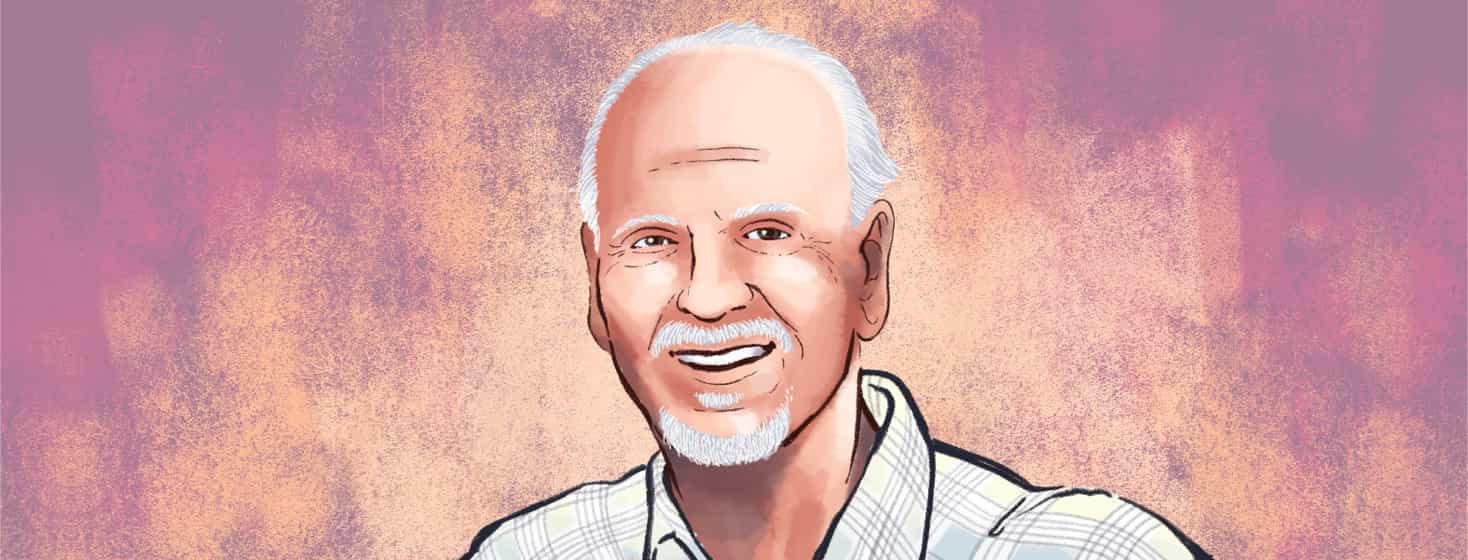Community Spotlight: Bob
Bob shares the challenges he has faced going through prostate cancer after losing his wife and son. He talks about how their losses influenced his emotional health and decision-making, and also about what he wishes others knew about prostate cancer.
Tell us your diagnosis and treatment story
In June of 2020, during a visit to my family doctor since my PSA had not been tested for several years, I asked for the test along with my regular blood panels. Although everything else looked quite good, my PSA result came back an alarming 9.98! My most recent test 5 years earlier had come back at 2.1. That change prompted a referral to a urologist.
A recheck of PSA in September came back at 14.49, a steep increase in so short a time! MRI indicated a significant mass in the left anterior of my prostate. A bone scan found no evidence of metastasis. A biopsy of 15 cores in November resulted in a Gleason score of 4+3=7, Intermediate Grade, Unfavorable.
My urologist indicated despite my age, my personal life expectancy dictated we actively treat rather than simply monitor it. I consulted a surgeon who told me my risk factors of age, history of diabetes, and deep vein thrombosis (DVT) with pulmonary embolisms (PE) made abdominal surgery especially risky for me. I could die on the table of heart attack, stroke, or PE.
He was not optimistic about nerve sparing, and because of the size of my prostate, he said he might have to go into the neck of the bladder to get it all. He insisted I consult with a radiation oncologist before making my decision.
Ultimately, for a number of reasons, I opted for IMRT with 6 months of androgen deprivation therapy (ADT). I began ADT in January 2021 and started a program of 28 hypofractionated IMRT treatments in early April. I completed IMRT sessions in mid-May. My 6-week follow-up PSA test came back at 0.324. I anticipate, as of this writing, my next blood test in September will show it has dropped much farther by then.
You are a widower. How has that affected the challenges you have faced?
My wife of 47 years passed away of pancreatic cancer in March of 2019. Our mentally and physically handicapped son, who had lived all his life with us, followed her in death almost 9 months later on New Year’s Day 2020, losing a long, grueling battle with lung cancer.
These events turned my life upside down. Suddenly, I found myself very much alone to face the diagnosis and treatment of my own cancer. My wife and I had planned to grow old together, each of us security for the other. After her passing, I had no choice but to face life’s challenges alone without her loving support. Layered on top of these major life-changing events was the COVID pandemic, which further isolated me from outside human contact.
I have to admit it has been very tough sledding while making my way through this process. So many times I have wished I had my wife and son to support me both emotionally and physically. Part of my decision to undergo IMRT rather than surgery was the fact I would have no one at home to help me during recovery from surgery.
What would you tell other widowers who are going through this?
I find it difficult to give advice to anyone, for we all have our own set of circumstances to deal with, and we all must grieve our losses in our own way. All I can say is despite all of life’s hardships I have faced and continue to face, for me life is still worth living, and it’s worth the struggle. My dear beloved wife would want it no other way.
You keep a journal. How has that been helpful?
I began keeping a daily journal shortly after my initial diagnosis of cancer. So many things were happening so quickly, I felt a need to document things as I went along. Six months, a year, or years from now, I wanted to be able to recall the timing of events, the reasons things went the way they did, and the reasoning behind the decisions I had made.
Beyond documenting these things, my journal has become an outlet for my emotions, especially during the isolation imposed by the COVID pandemic. Counseling in group settings was not something that was available to me. In writing out my raw emotions, I found I was able to then take a step back and look at things in a dispassionate way to better analyze and understand what I was feeling. It became a form of self-counseling, emotional therapy for me.
What do you wish others understood about prostate cancer?
I have to say my greatest peeve is the fact so many tend to minimize a diagnosis of prostate cancer. I have often said prostate cancer is the Rodney Dangerfield of cancers – NO RESPECT! I hear such dismissive remarks as, "If you’re going to have cancer, prostate cancer is the one to have!" After my diagnosis, I had 1 healthcare professional tell me, "Don't wig out! Prostate cancer is slow-growing!" If that remark was intended to be comforting, it missed the mark.
I even had 1 well-meaning person tell me I need to "Suck it up!" Such comments minimize the impact a diagnosis of prostate cancer has on the person. They are not helpful at all. Far from being supportive, they are insulting and demoralizing.
Many people don’t understand that prostate cancer can and does kill in a merciless way. Many men struggle undergoing treatments that significantly degrade quality of life, in an effort to just hang on for a few more precious months of existence. Any cancer is still cancer and is not to be minimized. Walk a mile in my shoes, and think before you speak!

Join the conversation